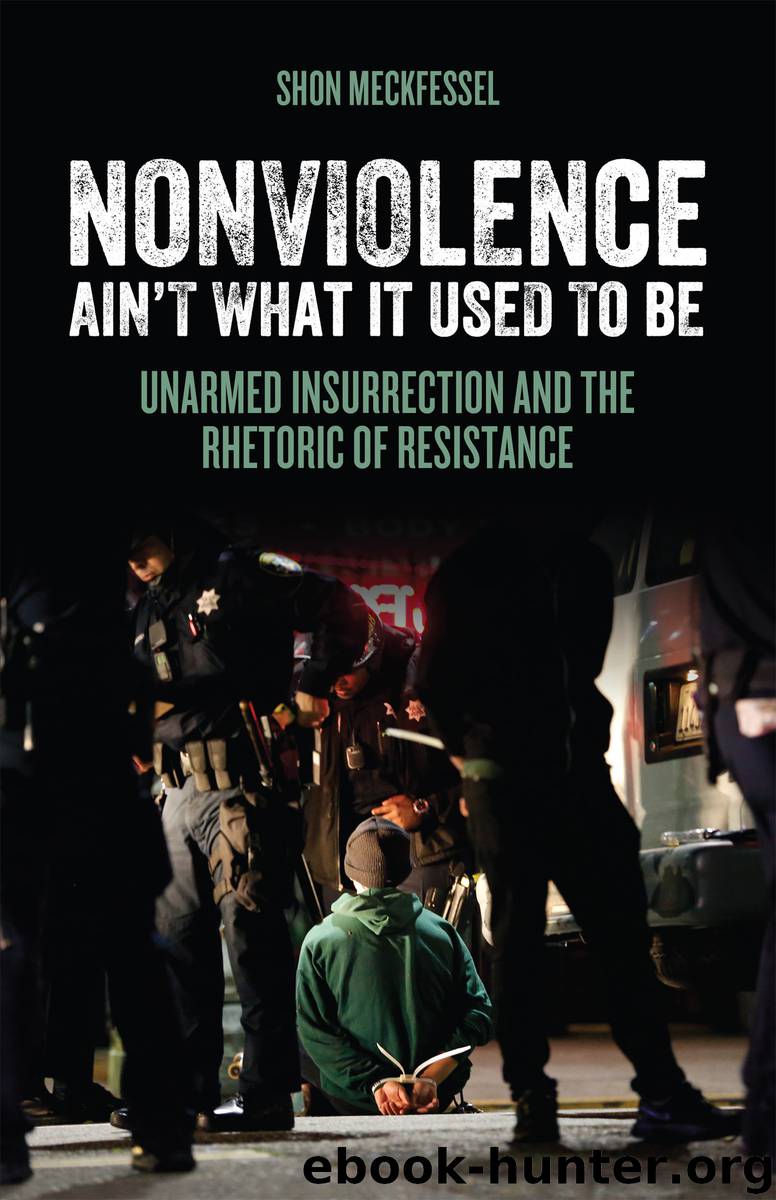Nonviolence Ain't What it Used to Be: Unarmed Insurrection and the Rhetoric of Resistance by Shon Meckfessel

Author:Shon Meckfessel
Language: eng
Format: epub
Publisher: AK Press
Published: 2016-09-22T16:00:00+00:00
Forcing Comparisons
You are suggesting broken windows are worse than broken spines.
—DeRay Mckesson193
In 2012, months after Occupy Seattle had fallen apart during debates about whether the movement should sign a “nonviolence agreement,” I attended a public discussion in a local Quaker Friends Center, where an anarchist and a nonviolence trainer attempted to come to terms around the difficult issues of violence and nonviolence. At the outset, the anarchist tried to establish what must have seemed like obvious common ground: violence should be defined exclusively as harm or threat inflicted on living beings, not, for example, on inanimate objects. Audience members immediately interrupted his introduction, and the three-hour event never moved beyond this initial disagreement of definition, much to the dismay of the anarchist, who had prepared the points of a discussion that never even got going.
Puzzlingly, the experience in the Friends Center is far from unique. Nearly every time property is destroyed at a demonstration, the same conversation follows almost immediately: young radicals ask whether firefighters wielding axes to save babies from burning buildings should be called violent, while proponents of nonviolence invoke Kristallnacht and burning crosses. Why does this argument keep coming up? And why bother discussing the issue at all if it is destined to go around in the same fruitless circles?
Massimo De Angelis’s concept of “value struggle” might help us understand what is at play in such debates. When an antagonism that was previously naturalized, invisibilized, or hegemonically fixed is suddenly made present and explicit, the values represented by the poles of that antagonism are called into question, unfixed, and relativized. They become options one might choose between, worthy of comparison and deliberation, rather than unquestioned premises. Describing a press conference given by the British minister of labour, De Angelis illustrates the difficulty of approaching questions about the “economy” in the era of neoliberal hegemony, when the “freedom” of the market is presumed to be a matter of consensus:
The Labour minister highlighted progress, winked at the critics and spelled out policies that, in the usual neoliberal style, are all geared towards and justified in terms of creating “effective competition”, a condition, we were told, that is indispensable for fighting world poverty. When challenged to explain what happens when a country has an “absolute trade advantage”, like China, and the consequence of that is, for example, the ruin of Bangladeshi workers in the textile industry and their communities, he explained that “competition is a fact of life”. Right, I can imagine what a woman in the struggle in the 1970s would have said to a man claiming that patriarchy is “a fact of life”, or a black about racism being a “fact of life”, or a migrant about border control being a “fact of life”, or a gay about homophobia being a “fact of life”, or an indigenous person about privatised sacred land being a “fact of life”. In all these cases, in a wide range of modalities, what these struggling subjects would have said and done is to contest a relational mode they did not value, indeed, that they abhorred.
Download
This site does not store any files on its server. We only index and link to content provided by other sites. Please contact the content providers to delete copyright contents if any and email us, we'll remove relevant links or contents immediately.
| Anarchism | Communism & Socialism |
| Conservatism & Liberalism | Democracy |
| Fascism | Libertarianism |
| Nationalism | Radicalism |
| Utopian |
The Secret History by Donna Tartt(19085)
The Social Justice Warrior Handbook by Lisa De Pasquale(12190)
Thirteen Reasons Why by Jay Asher(8909)
This Is How You Lose Her by Junot Diaz(6885)
Weapons of Math Destruction by Cathy O'Neil(6279)
Zero to One by Peter Thiel(5801)
Beartown by Fredrik Backman(5751)
The Myth of the Strong Leader by Archie Brown(5507)
The Fire Next Time by James Baldwin(5442)
How Democracies Die by Steven Levitsky & Daniel Ziblatt(5218)
Promise Me, Dad by Joe Biden(5153)
Stone's Rules by Roger Stone(5087)
A Higher Loyalty: Truth, Lies, and Leadership by James Comey(4960)
100 Deadly Skills by Clint Emerson(4924)
Rise and Kill First by Ronen Bergman(4788)
Secrecy World by Jake Bernstein(4752)
The David Icke Guide to the Global Conspiracy (and how to end it) by David Icke(4717)
The Farm by Tom Rob Smith(4507)
The Doomsday Machine by Daniel Ellsberg(4490)
